EXCLUSIVE: Shocking Practices of Forced Puberty among little Syrian Girls
In northern Syria’s displaced camps, little girls are forced to use hormones to speed up their menstruation and get married
This report in collaboration with frontline in focus and frontline focus XR
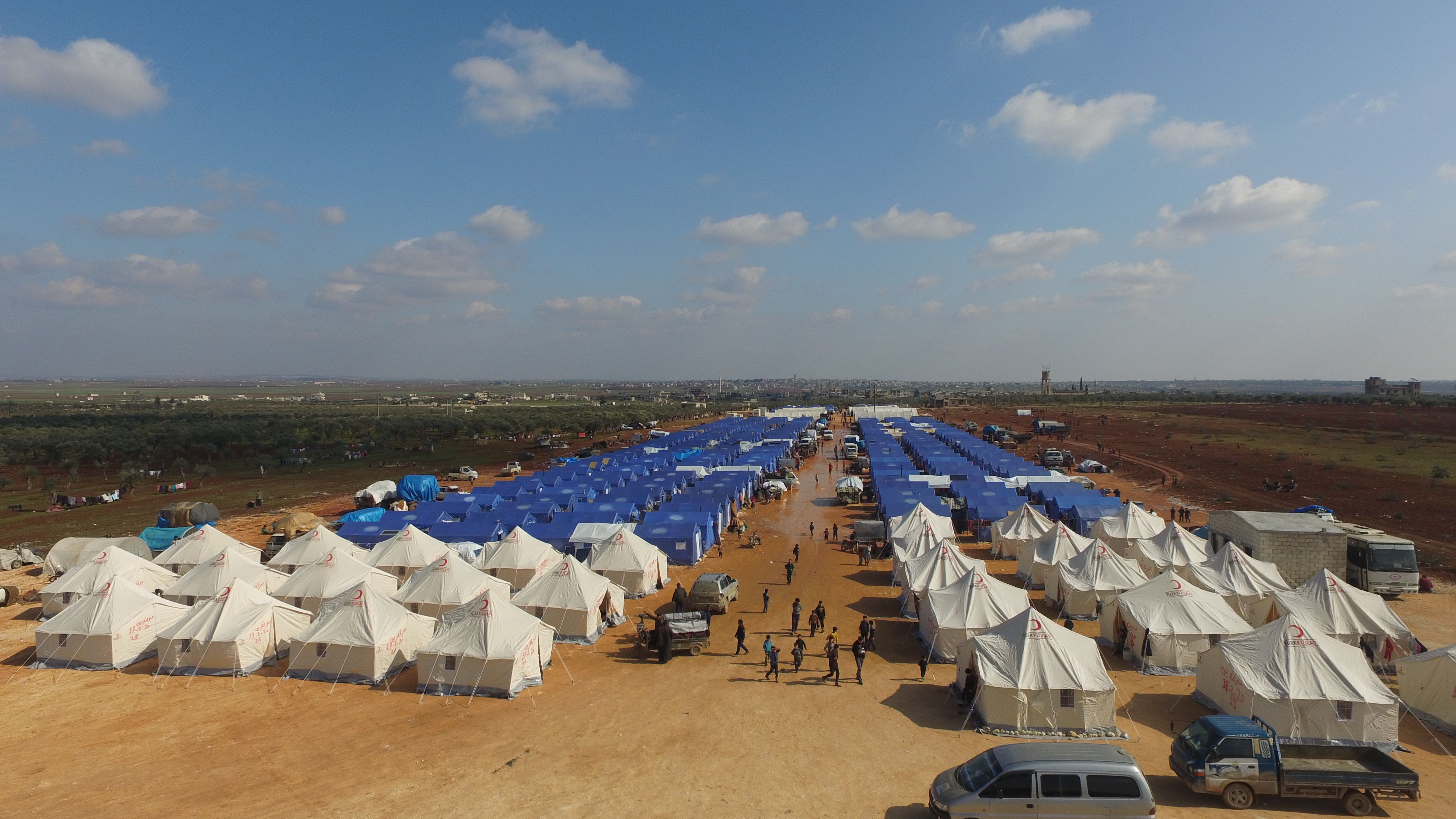
Samar* was only 14 when her father forced her to take some pills in their tent in Salqin, northwest Syria. “Once my period started, I was forced into marriage,” the now 16-year-old girl told TinyHand in a secret phone call arranged by a midwife. “My marriage lasted for almost a year and a half,” she added, “In that time, I got pregnant and lost the foetus. My husband then divorced me.”
This phone call had to be confidential as this investigation revealed what is seen as a taboo, which many avoid talking about.
As part of this investigation, we interviewed a number of girls and mothers whose daughters were exposed to the same practice. We discovered that this widespread phenomenon has pushed health directorates in Aleppo and Idlib to take decisions to ban the sale of hormonal drugs.
This report unveils the full story of “forced puberty” and the coercion of girls, who have not yet menstruated, to intake hormonal drugs with the aim of accelerating puberty and having them married.
To ensure our sources’ confidentiality and safety, we used pseudonyms in most cases.
All Started in 2020 When Inaam* Held a Clue by Accident
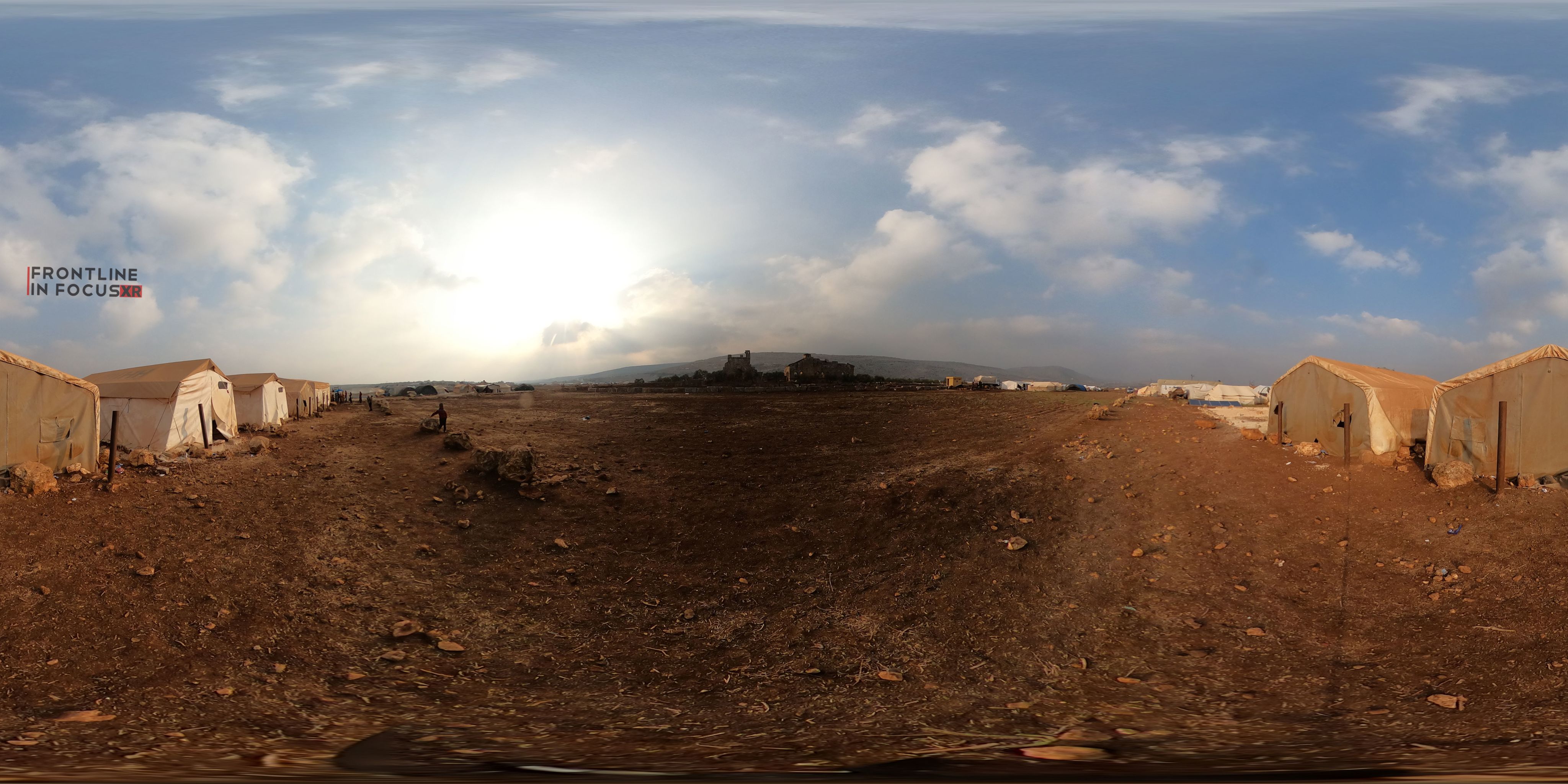
The story was brought to the public thanks to Inaam, who preferred to stay anonymous for her safety despite being an influencer in northern Syria.
Since 2015, Inaam works as a humanitarian worker and focuses on fighting sexual violence against women. In 2020, she joined a sexual reproductive health technical working group to unveil new cases of sexual violence against women when she accidentally came to discover cases of forced puberty. In a chat with a midwife, she heard a story of a 12-year-old girl, who was forced by her father to take pills to speed up her period.
“That child’s story could have become a mere passing, to-be-forgotten chat, but I brought up her story in a meeting with the anti-violence team,” Inaam told TinyHand. “Her story turned out to be among the undisclosed, and hitherto, undiscovered cases of sexual violence against females. Everyone agreed, so we started looking for similar cases. Then came the shock; there are many young girls who were forced to take pills to induce puberty.”
Inaam then found that parents in some displaced camps in northwest Syria did not just force their daughters to take such pills, they even beat them on the back, thinking they can speed up their puberty this way.
Some parents resort to various methods, such as hitting their little girls on their backs, to speed up puberty.
After research and follow-up, it had become clear to Inaam that this practice is widely spread in the camps of northern Syria, especially in the camps of Atmeh, Salqin and Harem.
Most of the cases Inaam followed were from the Salqin and Atmeh camps, including the case of two sisters, 14 and 12 years old, who were being beaten by their father on their backs in addition to taking medicines. “It is believed that beating accelerates menstruation,” explained Inaam, “That man is not the only one who believes such an idea, many others in these camps think that way.”
Idlib and Aleppo Ban the Sale of Hormonal Drugs

Late in June 2020, the United Nations Population Fund (UNFPA), issued a press release based on the research conducted by Inaam and the team working in reproductive health, according to a reliable source with the Fund.
The press release spoke explicitly of new forms of violence increasing in intensity and effect, such as forced puberty - which involves injecting young girls with hormones to induce puberty for the purposes of child marriage or sexual exploitation.
The press release spoke explicitly of new forms of violence increasing in intensity and effect, such as forced puberty - which involves injecting young girls with hormones to induce puberty for the purposes of child marriage or sexual exploitation.
It also highlighted the tragic conditions of 5.9 million women and girls, many of whom report that gender-based violence continues to plague their daily lives, including harassment, family violence and domestic violence.
About four months after the statement, the health directorates of Aleppo and Idlib issued decisions banning the dispensing and taking of medicines that contain sex hormones such as (testosterone, progesterone and oestrogen) without a prescription stamped by a health facility and signed by a doctor, under penalty of legal liability.
In an interview with an official in UNFPA, she confirmed to tinyhand the recent decisions. “We consider these decisions a success for the great research mission that we carried out,” she said.
Workers at the UNFPA’s sexual reproductive health technical working group approached the health directorates in Aleppo and Idlib, presenting their data and the UNFPA’s detailed report on forced puberty. As a result, and according to exclusive confirmed information, this cooperation pushed the directorates to issue the following decisions:
After search, we managed to obtain copies of the ban decisions issued by the health directorates of Aleppo and Idlib.
The Aleppo Health Directorate directed all hospitals, health centers, private and mobile clinics, psychological treatment units and pharmacies, that it is forbidden to disburse and trade hormonal drugs, especially those containing progesterone and estrogen, without a prescription stamped by a health facility and signed by an attending physician.
A copy of the ban decision issued by the Directorate of Aleppo:
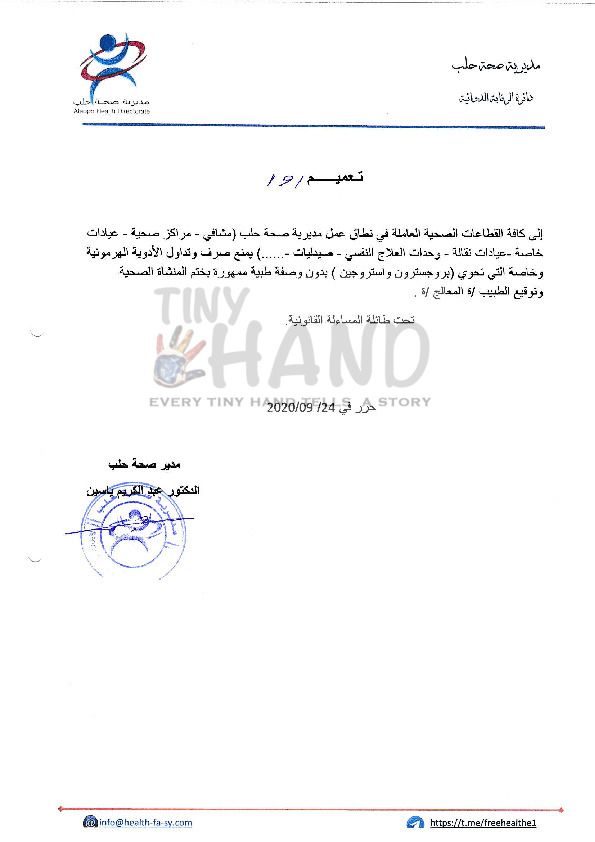
In the same month, the Idlib Health Directorate issued a similar decision prohibiting pharmacies from dispensing of medicines containing sex hormones (testosterone, progesterone, and oestrogen) without a prescription, subject to legal accountability.
A copy of the ban issued by the Idlib Health Directorate:
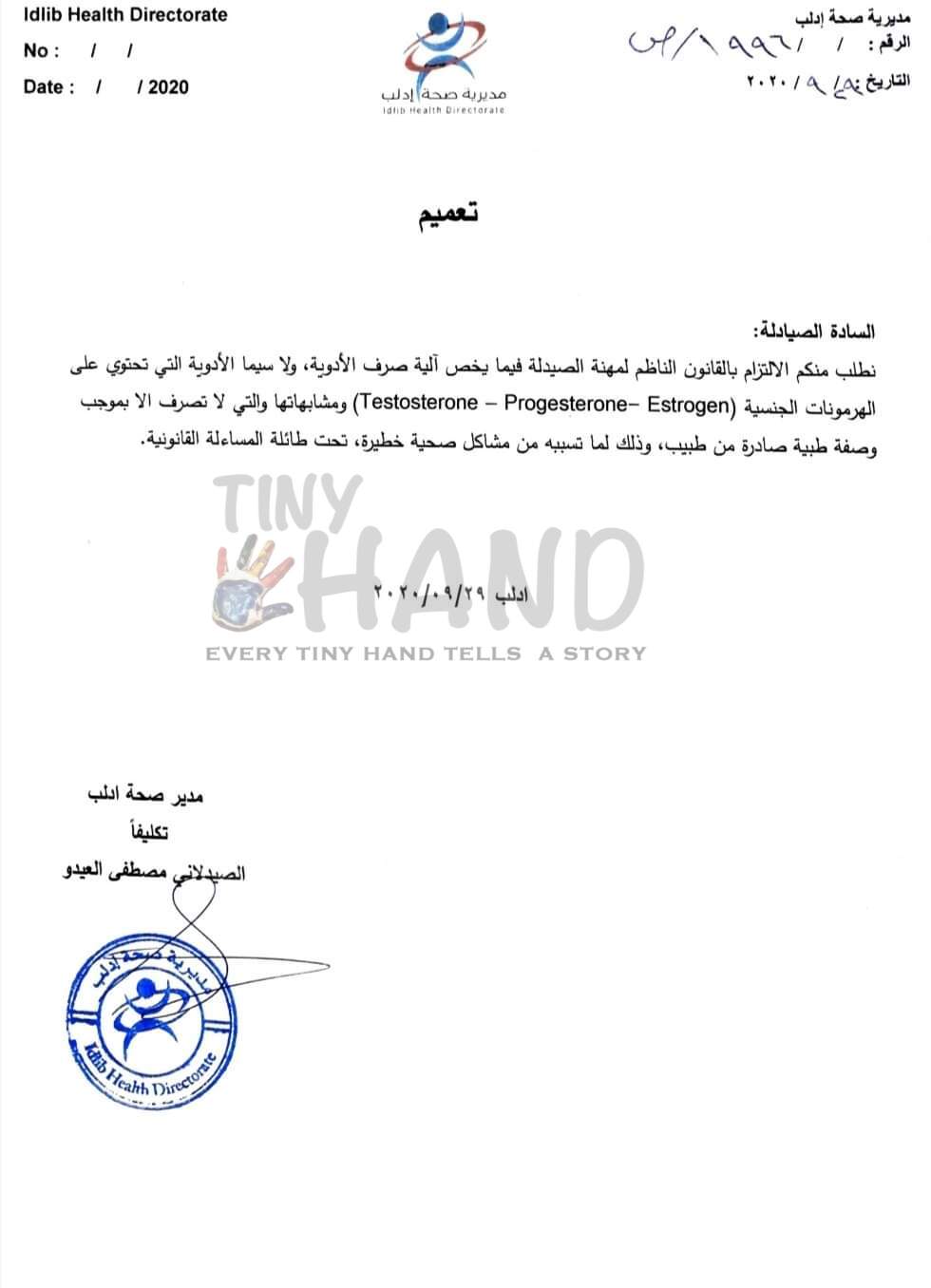
The team that worked on the UNFPA report considered this ban decision "a significant achievement." Consequently, they believe that it will put an end to the circulation of these drugs, providing a form of protection for underage girls who are vulnerable to sexual violence and early forced puberty.
But did pharmacies stop selling these drugs? Did parents stop forcing their daughters to take such pills?
The answer is NO…

Inaam* seemed unable to provide a clear answer about the extent of compliance with the decision that prevents pharmacies from selling these drugs in pharmacies. However, she confirmed that she still encounters cases of girls intaking such pills.
It was not hard to get an answer. It only required us to try to purchase these drugs without a prescription. Indeed, it turned out to be easy to obtain; our last purchase of such medicine was on May 18, 2023.
No pharmacy refused our request to purchase the medicine, and they did sell it to us. This applies to pharmacies in the countryside of Idlib and Aleppo. We got Progestan 100 mg, which contains 30 pills, for $6.
In an interview, Ahmed*, a pharmacist, said: “Imported medicines are not subject to price control. Every pharmacist sells it for whatever price he wants. However, pharmacists usually add 33 percent of medicine’s original price.”
Regarding the decision of the Health Directorates, he confirmed that he had never heard of it. He mentioned that the surveillance process is merely a formality, as the representative only collects medical prescriptions without comparing them with the volume of medicine sold.
For his part, Abdullah*, a pharmacist working in Idlib, said: “With money, you can purchase whatever you want. A physician may decline to write a prescription, but that does not prevent us from buying the medicine at a higher price than if it was with a prescription.”
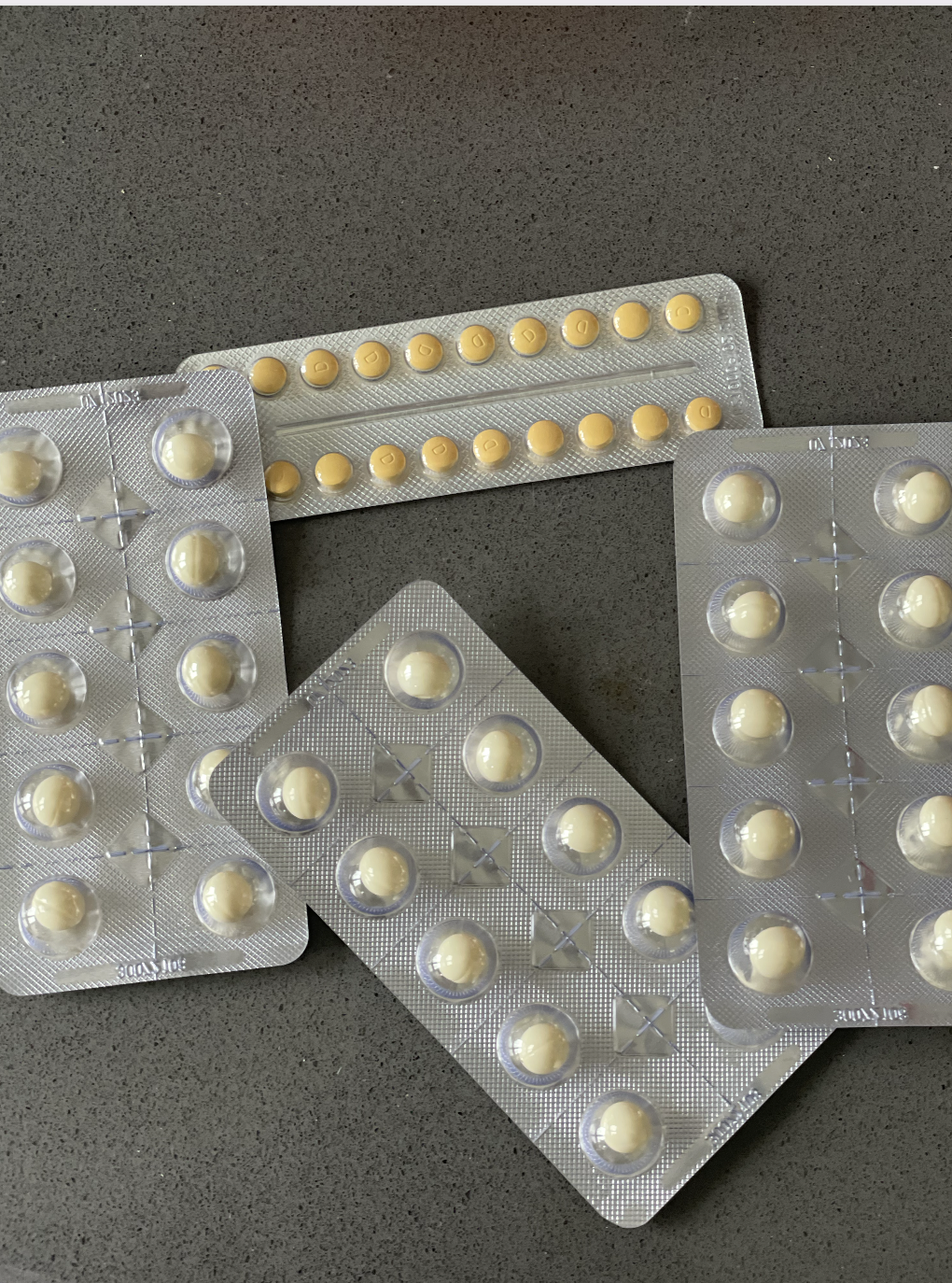
According to the information we got, there is a large number of them pharmacies that have not stopped selling those medications. However, the quantity of their circulation varies in those areas because there is no control and regulation of the sales and circulation processes.
To explore the surveillance mechanism imposed on pharmacies and the sale of medicines without prescriptions, we contacted a source at the Health Directorate in Idlib.
He explained that the Ministry of Health in Idlib has been in charge of monitoring the work of pharmacies for a year, while the role of the Directorate is limited to monitoring public hospitals.
He added that the control process is generally carried out by conducting patrols on pharmacies and hospitals to verify the mechanism of selling prescription-only medicines (POMs).
The source explained that there are attempts to control these matters, but there is still a “major shortcoming due to people's lack of awareness, which is necessary to help control the sale of medicine without a prescription.
In turn, Dr. Radwan Kurdi, Head of the Health Directorate in Free Aleppo’s Governorate, confirmed that the Directorate warned pharmacists against selling these medicines without a prescription.
He told TinyHand: “However, this is not enough as the matter requires an agreement between the medical institutions and departments and their cadres of physicians and pharmacists to regulate the circulation of hormonal medicines.”
So far, he explained that there is no such a coordination to regulate the circulation of hormonal drugs. “A mere warning circular is not sufficient to set things straight,” he said, “The circulation of these drugs is exclusively linked to physicians and pharmacists’ ethical and professional conscience.”
Dr. Kurdi added that all this is caused by the lack of a central authority, distributing powers among the local councils, the domination of various factions, and the lack of coordination between scientific unions to reach practical outputs and a method for implementing and adhering to them.
Regarding the methods that might control the sale of these drugs, Kurdi stressed that a pharmacist must be present in his/ her pharmacy so they can know exactly which drugs require a prescription, and that hormonal drugs should be prescribed by specialized doctors only.
He added that such medicines should not be sold to adolescents and children, even if they have a medical prescription, without having the person concerned on site to explain their use and side effects.
“It is important to impose financial and moral fines, which could include suspending pharmacists’ license in the event of repetition of such violations,” he concluded, “Physicians and pharmacists know very well what sex hormones are and what their side effects are.”
But what is the situation in the camps of northern Syria?
Cases of Forced Puberty from Northern Syria’s Displaced Camps
Beating and Drugs for Girls Aged 12 and Over
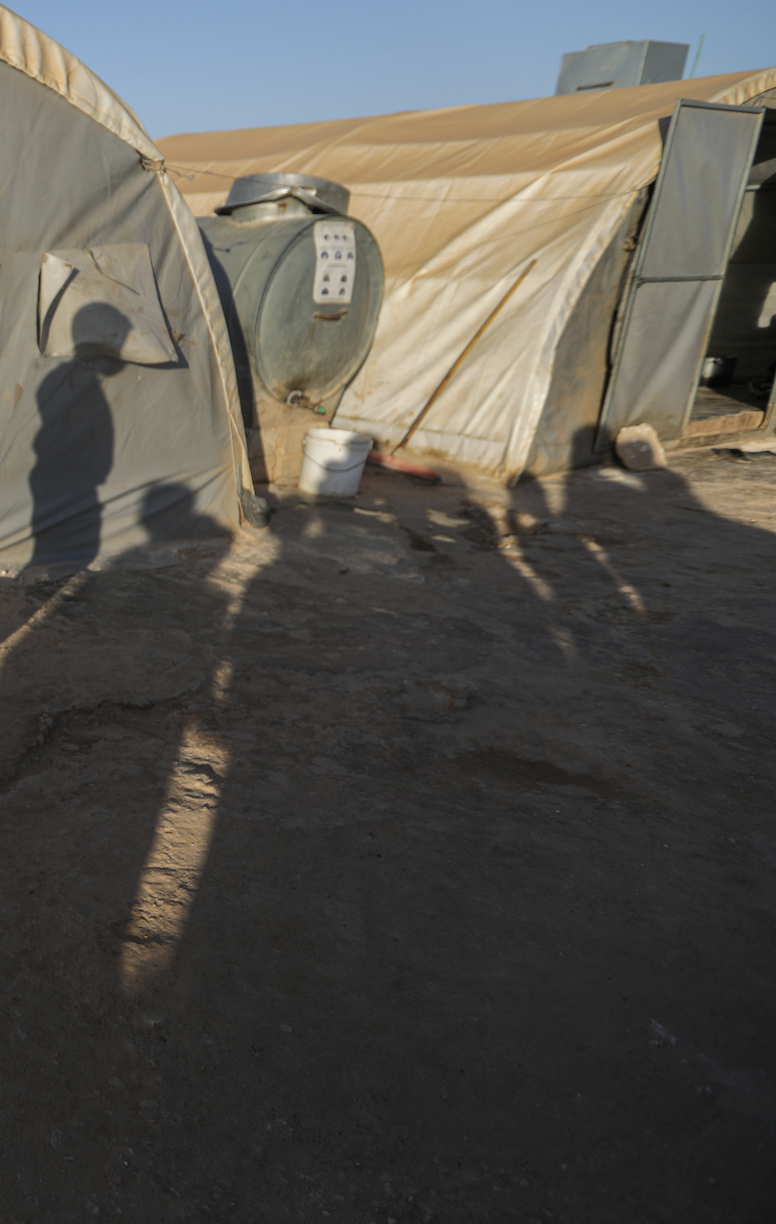
Fatima*, a woman in her fifties, has been working as a midwife for 21 years. She spent the last six years in the Syrian camps and attended several workshops and courses about the protection of minors. The woman helped us meet a number of girls who took these pills, besides meeting mothers whose daughters also took such pills.
Most of these girls were second wives, orphans, or the daughters of poor families.
What is common among them, said Fatima, is “their parents’ desire to reduce the economic burden imposed by their daughters’ expenses, and speed up their marriage as soon as possible, using these medicines.”
Fatima receives at least ten similar cases every month. One of the cases that the midwife helped us with is Jamila*, a 17-year-old wife who took those pills three years ago to induce an early menstrual period. This led to her getting married, but she has not been able to conceive since then. Consequently, she plans to visit Fatima for assistance.
Her mother, who accompanied her, talked about Jamila's father who forced her and their second daughter to take medication. “Their father was very difficult. He prevented them from going to school and sought to marry them off at a young age,” she said, “The first got married when she was 14 years old, and the second when she was 15.”
However, Umm Youssef* has a different point of view, as she supported giving medicine and marrying girls at a young age. Her daughter, then 13, took the drug and became pregnant 3 years later. “They have children and they grow up together,” said the mother, who got married at a young age herself. “ It's better to get married early before it's too late. Today, Youssef is like a friend to me, he is closer to my age.”
Not Only Pills, Some Use Ovulation Inducing Injections Too..
According to Fatima*, the signs of menstruation appear after taking 3 to 4 pills. If there was no response, some resort to using ovulation inducing injections, which are considered more effective than those oral medications. “Unfortunately, such injections are available in pharmacies,” said Fatima.
Any licensed midwife can prescribe such medicines and injections, which can be obtained from pharmacies with a prescription. However, Fatima explained that these medicines and injections can be obtained without a prescription as well. She points out that there some midwives compete and brag that they were behind the pregnancy of these girls.
Nevertheless, Samar*, a 14-year-old wife from Salqin camp, was not lucky enough. She had taken these pills at her father’s request and menstruation occurred. After that, she got married and got pregnant. “I lost the foetus and got divorced after a year and two months of marriage,” she said.
With these words, Samar concluded her conversation on Fatima's phone, disclosing what many consider as a taboo that cannot be shared with others in a society that encourages the marriage of young girls.
Death Threats
Once a father found out that Amira*, a humanitarian worker, had shared his daughter’s story and told her about the pills she had taken, he sent her death threats.
Amira, who works in combating sexual violence against women, met a 12-year-old girl in a support center . During the workshop, the girl talked about being beaten by her father, who also forced her to take pills to speed up her period.
“When her father found out that she visited the center through a neighbour, he came to us and threatened us with death,” she said, “He asked us not to reveal what she told us."
Testimonies from Aleppo and Idlib

The following are quotes from a United Nations Population Fund (UNFPA) report on forced puberty, which TinyHand was able to obtain in full.
A gynaecologist from the Idlib region:
(The mother came asking for medicines for her 12-year-old daughter to speed up her period and get her married. I met three similar cases).
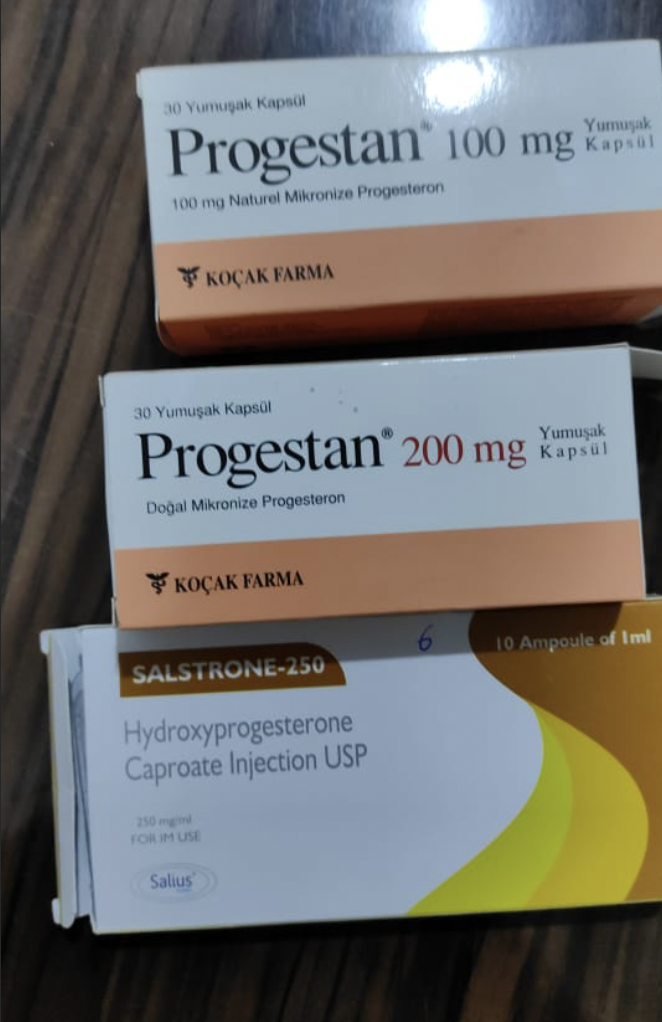
A case worker in the Aleppo region:
(Several months ago, a girl visited our center and revealed that she was forced to take hormonal drugs, without being fully aware of what these drugs were for, except that they accelerate her menstruation).
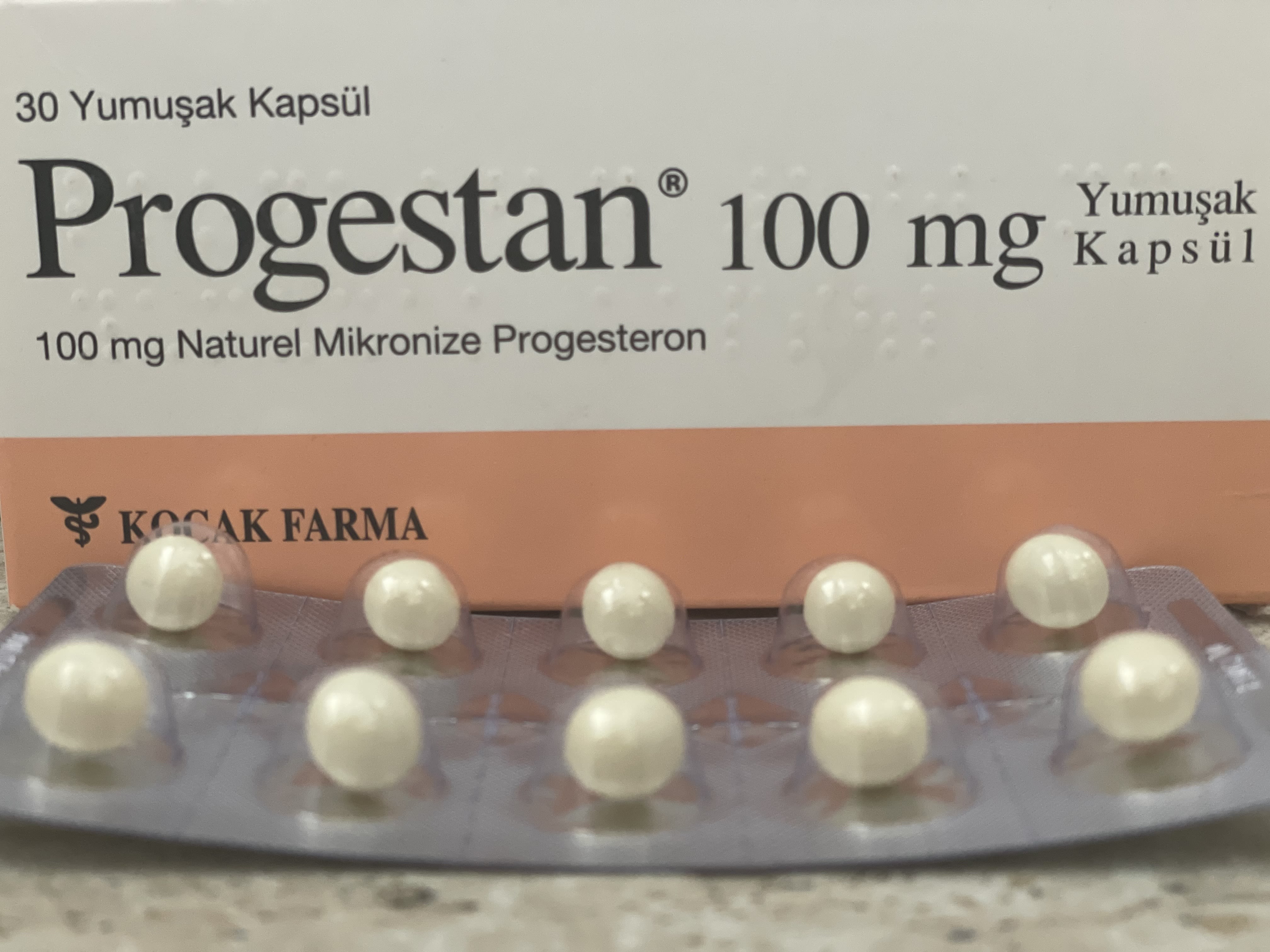
A psychological support worker in the Idlib region:
(In a group session, women spoke to each other about the possibility of inducing precocious puberty by taking certain hormonal drugs without showing any symptoms).

A midwife in the Idlib region:
(A mother came asking for medicines to speed up her daughter’s menstrual period, after they got her married months ago, before reaching puberty. At the time, her husband was asking her to get pregnant and give birth. This was not the only case of its kind we encountered).
A case worker in the Aleppo region:
(Several months ago, a woman asked us about methods that could help her 13-year-old daughter, who was about to get married, to get her period faster).
All this occurs despite the fact that these medicines cannot be sold without a medical prescription.
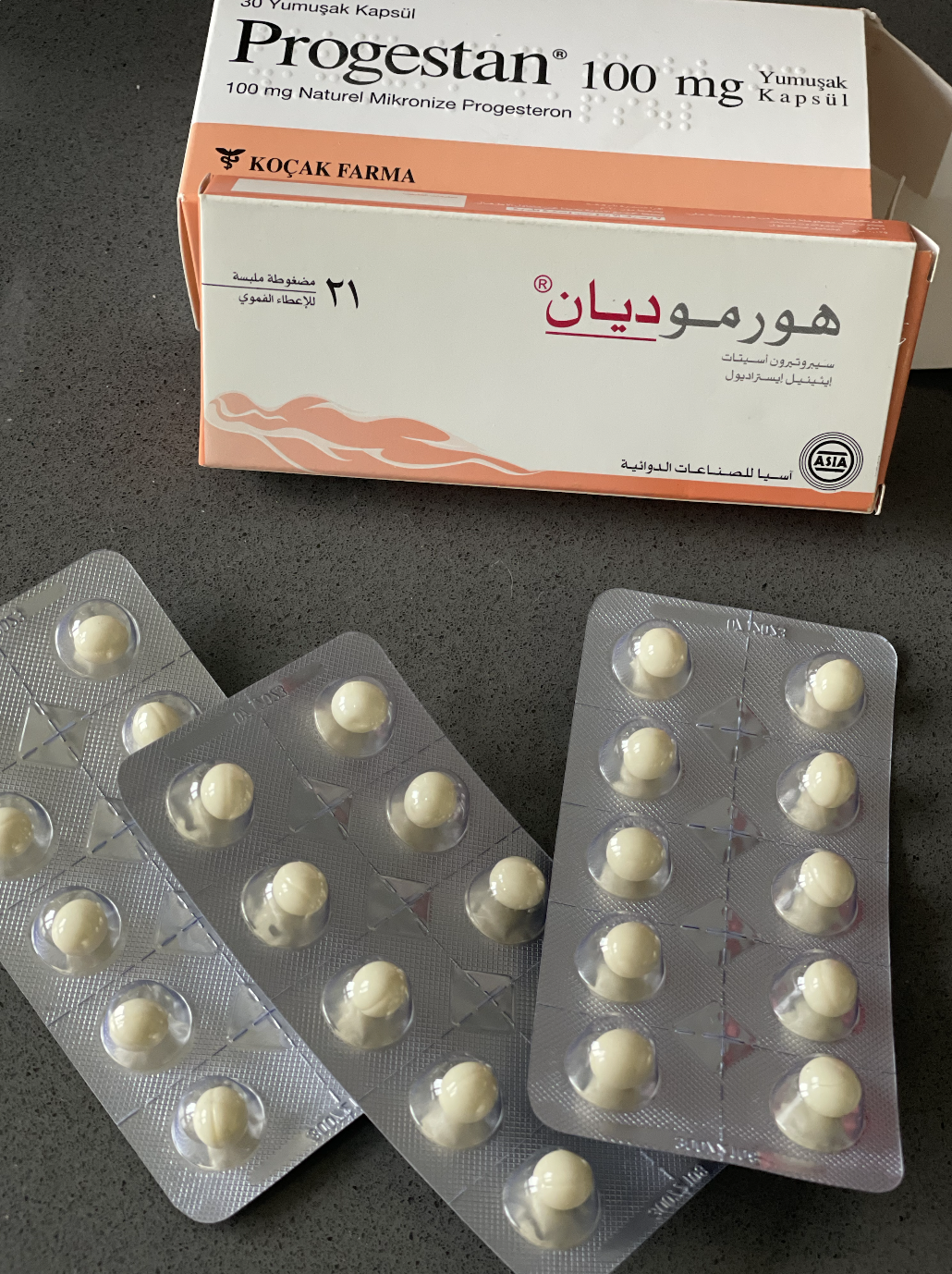
What does Syrian law say about forced puberty?
In our thorough investigation of Syrian law articles, we could not find a clear text that criminalizes a person who forces a child to take such medicines in order to speed up menstruation. However, we can resort to some important legal details in this regard.
To find out, we talked to the Syrian lawyer Rehada Abdoush, who asserted that the Syrian law protects the child from the time it is a fetus until he/ she reaches the age of majority. “Syria’s law punishes those who harm or abuse a child by dropping their guardianship,” she said, “This varies according to the type of crime.”
“Anyone who harms a child shall be punished according to special laws, including Article No. (21) that includes the Child Rights Law of 2021. This law came in line with the Convention on the Rights of the Child, which is ratified by Syria since the 1990s and confirmed its implementation,”
Abdoush told TinyHand, “This convention defined the child as: every human being below the age of eighteen years, and defines family neglect as any act or omission that results in harm to the child.”
On how such law articles can be used to defend the rights of girls who have been subjected to forced puberty, Abdoush explains: “In the case, girls are anyone who is below the age of 18, so they are protected by this law.”
She added: “According to Article 25, the state guarantees the right to health care services that includes all forms of treatment for children in health centers, psychological support centers and public hospitals, besides ensuring follow-up treatment for mental, chronic and intractable diseases.”
According to Article 63 of the Child Protection Law, a number of acts committed against children are criminalized, including the removal or disruption of a body organ, causing any permanent disability, and any sexual assault.
The penalty is determined by the Penal Code and laws. Some penalties might reach up to life imprisonment.
“But how do you get your right?” asked Abdoush, “This can be done through personal prosecution, even if the victim is a minor, by resorting the case to the Public Prosecutor and not to the police.”
“The supervisor, who could be a school teacher, a doctor, or the mother, can personally submit the complaint to the Public Prosecution,” she added, “This, in turn, refers the victim to forensic medicine and assesses the abuse. The person responsible for the act will be punished with the crime of harm or revocation of the guardianship or both.”
But how can this law be applied in the displaced camps under the control of the Syrian opposition?
Fahd Musa, Head of the Freedoms and Human Rights Committee of the Free Lawyers’ Association in northern Syria, told us it is possible to resort to the judiciary, but this is up to a personal claimant. For example, there are crimes that the public prosecution moves on his own, while others need a personal prosecution.
“The legal rule says that whoever causes harm to others is obliged to pay compensation,” he told TinyHand, “Of course, when there is a criminal offense and a personal claimant, the criminal courts in all these regions will put their hand on this call and decide on it, by conviction or innocence.”
And he confirmed that a physician or a pharmacist are held accountable in the event of prescribing these hormonal drugs, and can be punished by the Salvation Government’s Ministry of Health. This may lead to shutting down the pharmacy temporarily or permanently, and their case might be referred to the criminal judiciary, he explained.
In the opposition-controlled areas in northern Syria, there are over 1,400 camps, inhabited by about 321,000 families.

Temporary False Menstruation
Specialists in obstetrics and gynecology say that giving these drugs randomly causes the so-called false menstruation, which results from the stimulation of the ovaries and uterus with these external hormones to induce menstruation, but this menstruation is temporary and linked to the presence of these drugs.
For his part, Dr. Kenan Ziyadoglu, a gynaecologist and obstetrician, told TinyHand that the negative effects of taking these drugs, that cause "false menstruation", exceed this.
“Administering them before puberty can cause early menopause before the age of 35,” he explained, “This may even cause uterine or ovarian cancer. Such pathologies result from such interventions before the body is physiologically ready by intaking manufactured exogenous hormones. This leads to the large and rapid multiplication of ova, affecting uterine wall and women’s reproductive process.”
"Unfortunately, this is a very bad treatment,” he concluded, “It should not be prescribed to any girl under the age of fifteen.”
According to UNFPA, girls face significant pressure if they are unable to conceive or meet their husbands' sexual expectations due to their lack of readiness and maturity. This situation can make them vulnerable to various forms of violence.
If such medicines were intaken when the girl is approaching her puberty and there was ovulation and pregnancy occurred, then this age group are highly prone to develop several complications: prenatal bleeding, anaemia, premature labour, genetic abnormalities, and finally miscarriages.
Just as happened with Samar, who reached puberty and was forcibly married at 14, forcibly got pregnant, she aborted her foetus due to her immature womb. This ended up in divorce before she turned 16.
